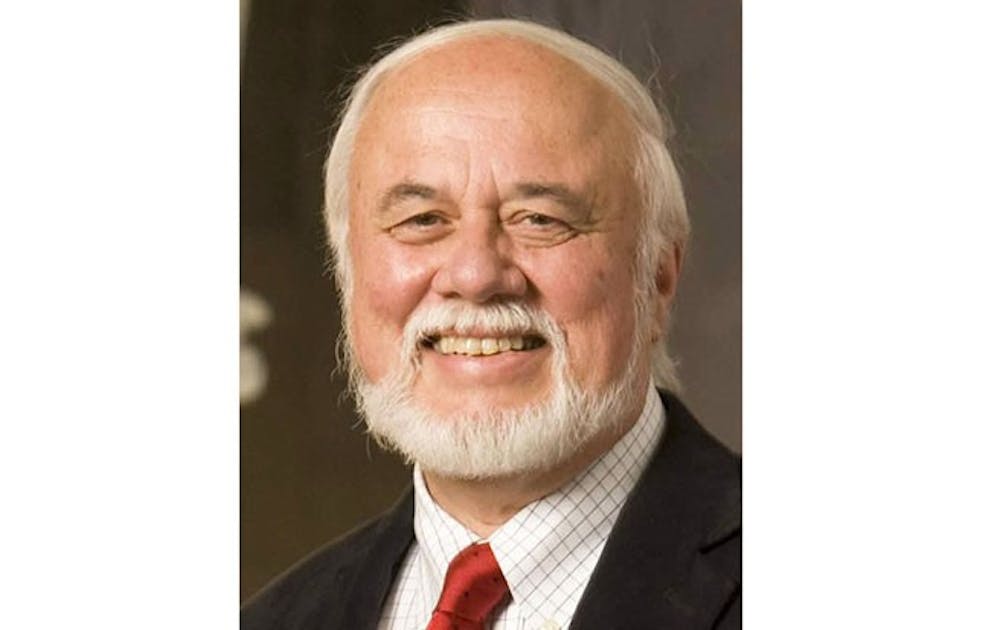Chemistry professor Alvin Crumbliss will receive the Charles H. Herty Medal, an annual award given by the Georgia Section of the American Chemical Society. The Herty Medal publicly recognizes the work and services of chemists who have contributed significantly to their chosen field. All chemists who have resided in the southeastern United States in the past ten years are eligible for the award. Crumbliss was given the award for his research on the biochemistry of iron and how different iron carriers mobilize and deposit iron at specific sites in a biological system, as well as for his leadership positions within the University and national and international organizations. The Chronicle’s Danielle Muoio spoke with Crumbliss about receiving the award and his research.
The Chronicle: What was your reaction to receiving the Herty Medal?
Alvin Crumbliss: I was surprised and honored. I had not expected this at all. I am indebted to those who nominated me and to the selection committee. Also, since this award is largely based on my research accomplishments, I am indebted to my faculty collaborators here and abroad, and the approximately 100 undergraduate, graduate and postdoctoral students who have worked in my lab to produce the results that have enabled us to advance the field of bioinorganic chemistry.
TC: Can you tell me more about your research that resulted in this award?
AC: Most recently we have been working on the mechanisms by which cells acquire, transport, utilize and store iron. This is an important area of research because iron is an essential nutrient for virtually all living cells. However, even though it is essential for life, iron in the wrong place at the wrong time and in the wrong concentration is toxic to life. This is the iron paradox. Consequently how nature controls iron is a very important research topic which links to human health and disease, as well as other areas of science.
TC: Can you talk more about the iron paradox and why it’s so important to address?
AC: Iron is acquired and controlled differently for different types of cells. The chemical processes of signaling and control associated with the metabolism of iron are widely varied throughout biology. The iron paradox means that the location and chemical environment of iron must be carefully controlled. Iron is an essential nutrient, but too much iron in humans can cause reaction with oxygen and other chemical agents in the body, which can create very reactive toxic species called free radicals. These free radicals can attack cell membranes and thus destroy the cell...[which] can accelerate the aging process [or] cause cardiac arrest. Too little iron in humans, [however], causes anemia.
Too much iron can occur as a result of a genetic disease called beta-thalassemia or Cooley’s anemia. Patients with this disease produce abnormal hemoglobin assemblies, which are then recognized by the body and destroyed, thus making the patient anemic due to lack of red blood cells. The solution to this problem is a blood transfusion. However, transfused blood contains significant iron and a transfusion every 30 days over a period of 15 to 20 years... results in iron overload and often death by cardiac arrest. Thus the patient dies from the cure—repeated blood transfusions—for the disease—abnormal hemoglobin synthesis....
In order to address this problem one needs to understand at a fundamental level how iron is transported in the body in a healthy individual. It was this problem, how to design a chemical agent to eliminate excess iron from an iron overloaded patient over a lifetime, that first got me interested in iron biochemistry 35 years ago.
TC: What inspired you to pursue this particular field of research?
AC: The importance of iron to human health and disease, and the multiple ways nature has evolved to deal with the iron paradox. [My lab is] also interested in how the iron in hemoglobin functions to transport oxygen from the lungs to the respiring cells in humans, [as well as] from the gills to the respiring cells [of fish] and also to the air sac that controls [their] buoyancy... All of these facets of the biochemistry of...iron... are what make the study of iron in a biological system fascinating and incredibly important.
TC: Do you plan on furthering this research or pursing any new research topics?
AC: We have yet to answer all of the important questions, so we will certainly continue this research. We also plan some new endeavors, including applying the principles of complexity science to iron transport processes, and chemical evolution.
TC: How has your research influenced you as a professor?
AC: My research has kept me excited about chemistry and the mysteries of nature, and excited about teaching students, both in the classroom and in my lab. My research has also enabled me to engage interesting colleagues at Duke and in other parts of the U.S. and Europe.
Get The Chronicle straight to your inbox
Signup for our weekly newsletter. Cancel at any time.

